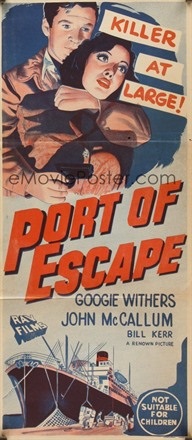Critical reception
The Monthly Film Bulletin wrote: "Although this melodrama is, in its modest way, respectably made, the direction is rather slack and the tension unevenly sustained. The playing is passable, with Bill Kerr making a brave attempt at the part of Dinty. Alexander Gauge brings a hefty authority to the role of a police inspector." [5]
Kine Weekly wrote: "The picture tackles its plot from a psychological angle but too much is left in the air, even though gunplay and the chase are introduced. Googie Withers acts with easy confidence and John McCallum seizes most of his chances, but all the same they make an incongruous couple as Anne and Mitchell, Bill Kerr has his moments as Dinty, and the rest are adequate. Moreover, the finale is showmanlike, and the exteriors impress." [6]
Allen Eyles at the Radio Times gives the film three out of five stars and writes that "The skilled performances of John McCallum and Googie Withers, and an atmospheric treatment of the London Docks setting, give this modest melodrama a considerable lift. ... An obscure director, Anthony Young, lets the pace slacken occasionally, but overall this is an intelligent and offbeat work that deserves to be better known, and probably owes much to its producer, Lance Comfort, an able director in his own right." [7]
This page is based on this
Wikipedia article Text is available under the
CC BY-SA 4.0 license; additional terms may apply.
Images, videos and audio are available under their respective licenses.
